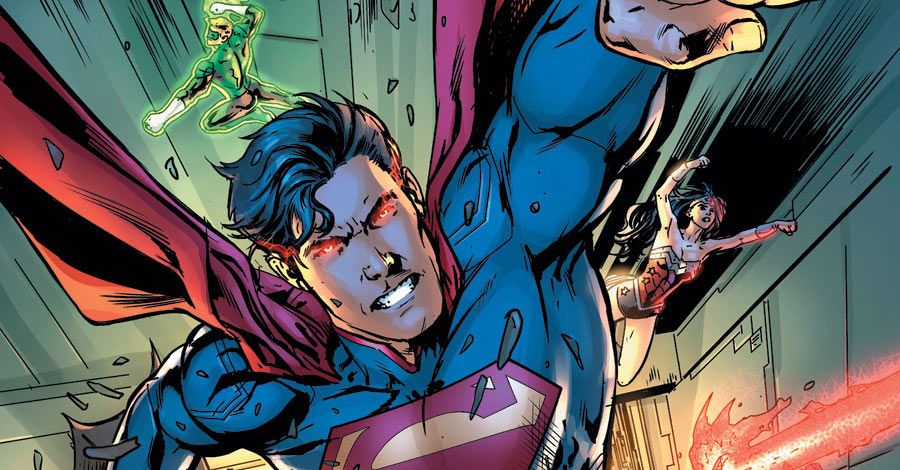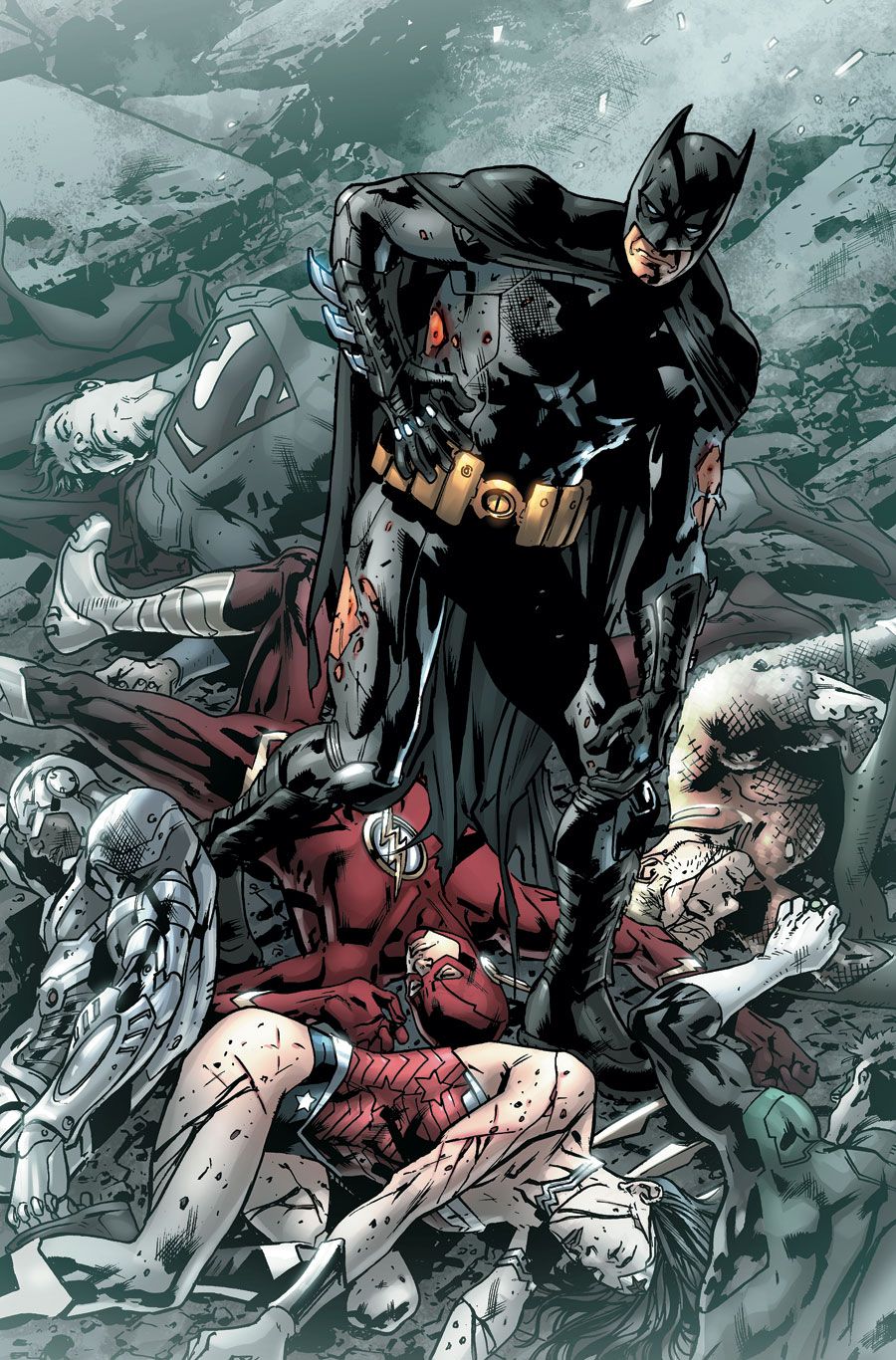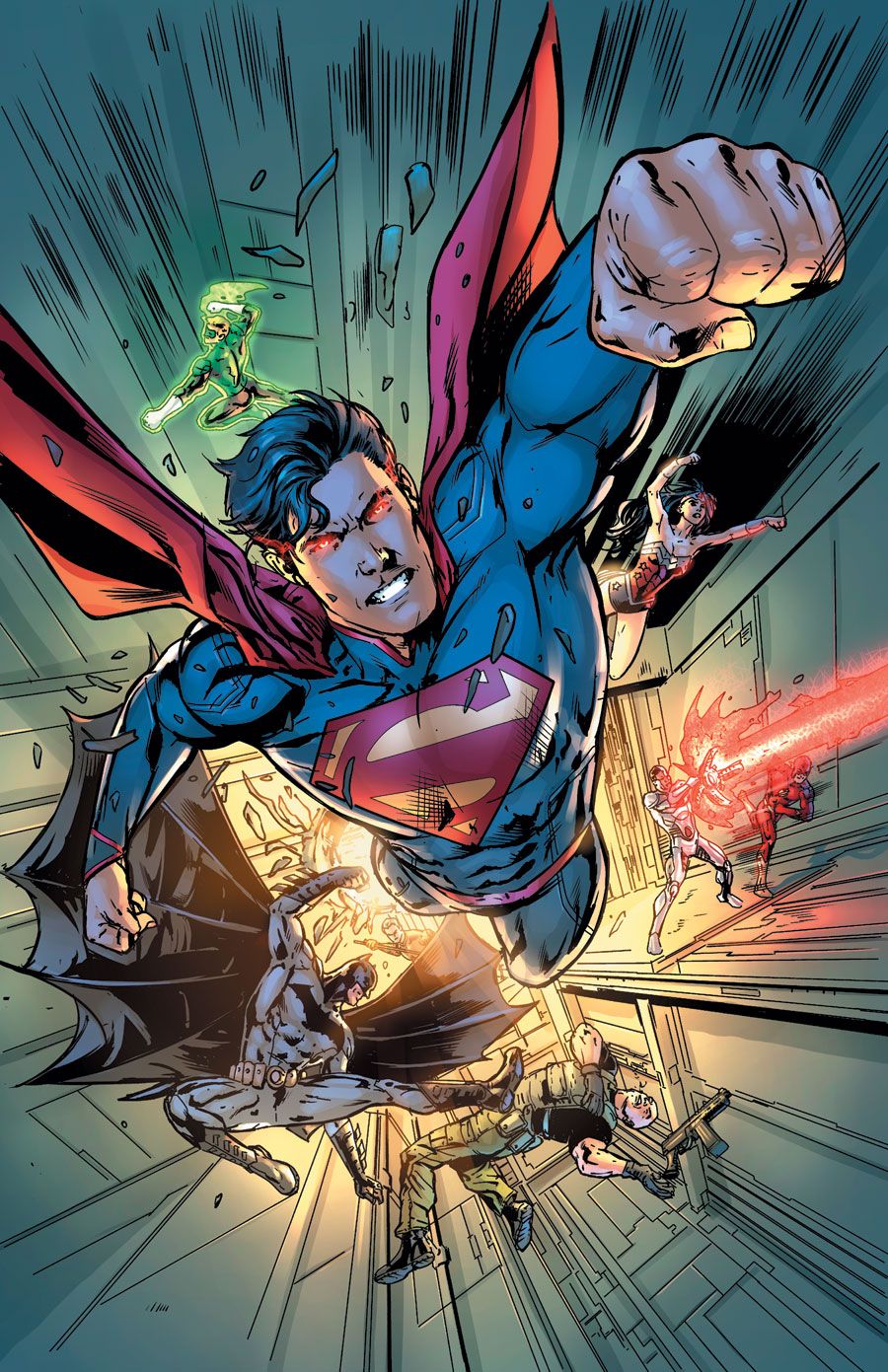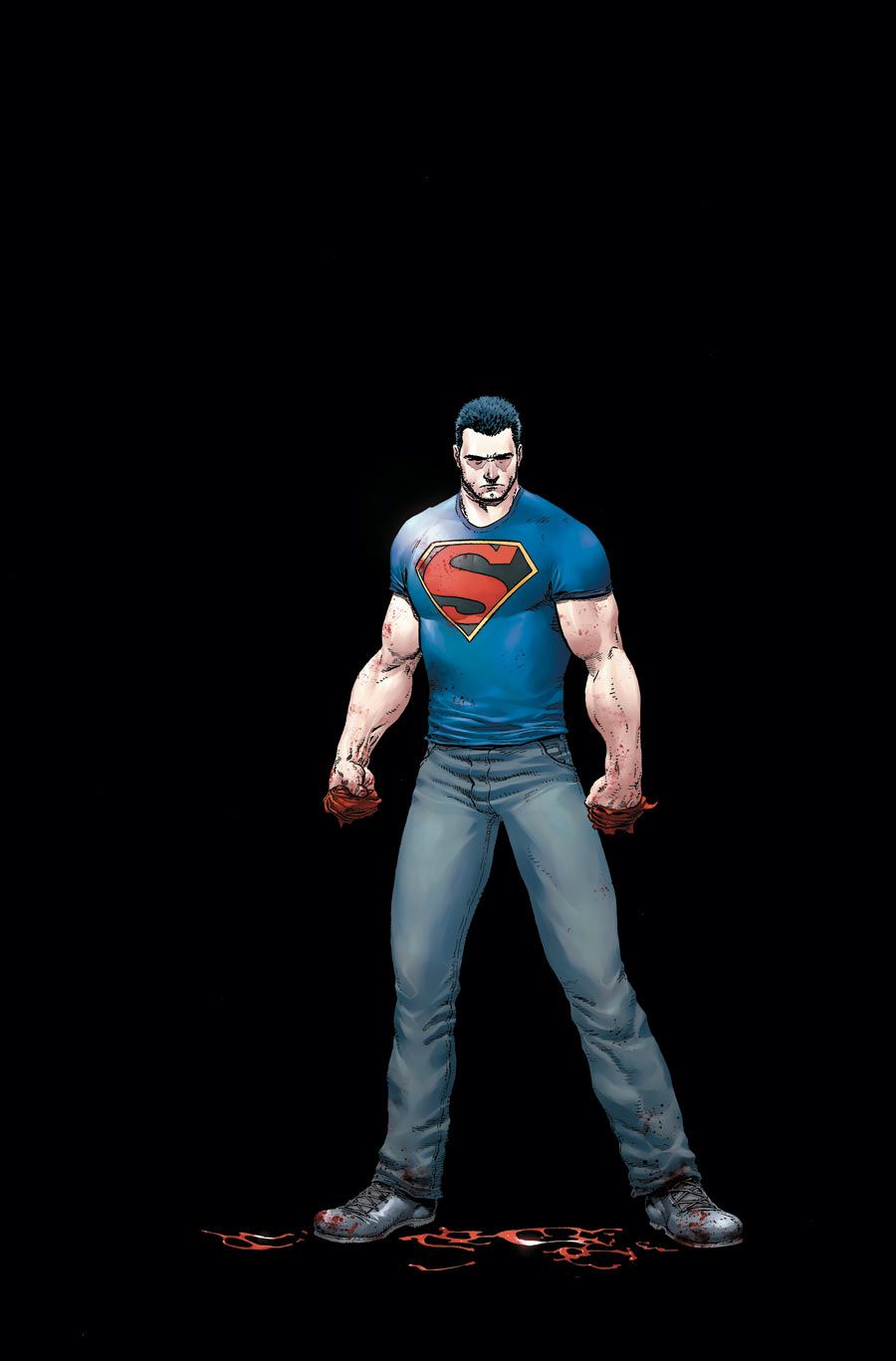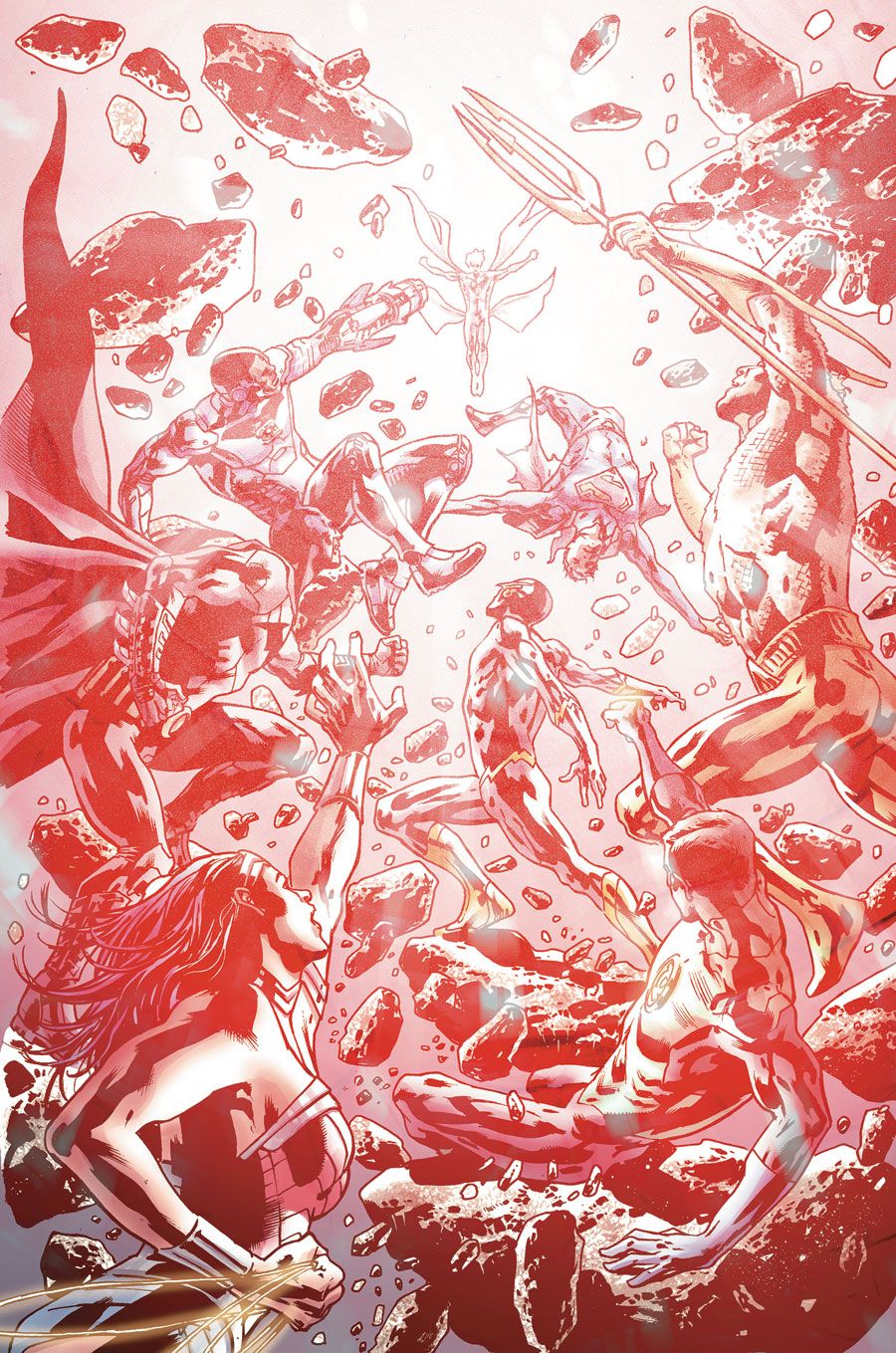After more than a decade illustrating some of the highest-profile stories at Marvel, Bryan Hitch is back at DC Comics in a big way. After all, it's hard to get much bigger than writing and drawing Superman, Batman, Wonder Woman, The Flash, Green Lantern, Aquaman and Cyborg in the monthly "Justice League of America" series, a regular dose of the type of widescreen action Hitch helped make famous on books like "The Authority" and "The Ultimates."
Yet right before Hitch took the reins of the new "Justice League of America" volume that launched in June, the superstar artist was focused on his creator-owned series at Image Comics like "Real Heroes," which he both wrote and drew, and "America's Got Powers," written by British talk show host and comics enthusiast Jonathan Ross. Finding himself lured back to the work-for-hire world with the promise of writing and illustrating some of the most recognizable superheroes in pop culture history, Hitch tells CBR News he's thoroughly enjoying what was originally intended to be a temporary experience, and plans to remain at DC Comics for the foreseeable future, working on creator-owned material as time allows.
With "Justice League of America" #4 and the latest in the team's conflict against Rao scheduled for release on Oct. 14, we spoke to Hitch at DC Comics' Burbank headquarters last month, discussing how DC Co-Publisher Dan DiDio long pursued him for a major project, his past as a young DC superfan, the challenge of sticking to a monthly schedule, what he might like to do at DC beyond "Justice League of America," the possibility of him writing a story for another artist to draw, and getting over his apprehension for writing and drawing Batman. And check back with CBR later in the week for the second half of our interview with Hitch, discussing more "Justice League of America" plans and how he sees his career progressing as both an artist and a writer.
CBR News: Bryan, in recent years you've moved more towards creator-owned work, and I'm sure you're going to be doing more of that --
Bryan Hitch: Much more, actually.
But right now you're back doing work-for-hire comics, and in a rather conspicuous way -- writing and drawing some of the biggest comic book characters of all time. How are you enjoying the experience?
That was what got me here. Dan had been talking to me since I left Marvel. I wanted to do creator-owned stuff; "Real Heroes" is very much something I've wanted to do, and Jonathan and I have "American's Got Powers." Dan kept talking about this project, or this writer, and it just never quite pulled me enough. Then, one or two years ago, I was on a holiday, I got an email from him that said, "Alright, wiseguy, what would you do?" It just sparked something -- straightaway, 20 minutes, I wrote up a one-page outline for what became "JLA" and the Rao storyline, and sent that in. Dan wrote, "OK, you're in. "
Originally, that was all I was going to do. It was going to be a five-issue thing, and I was off. It snowballed. What I didn't count on was the reality of actually finally getting to be here -- this is why I draw comics. All this stuff. This is why I'm in the game to begin with. I only ever grew up with DC -- it's all we could get. I didn't discover Marvel until I was well into my late teens, because there were no comics shops where I lived in the north of England, and newsagents stocked what they were given, and what they were given were DC Comics. In 1978, as an 8 year old, I'd roll out of the cinema almost every weekend from watching "Superman: The Movie" -- because they played for months in those days, with no DVDs or home videos. If a movie was popular, it just was on. "Star Wars" played for the best part of a year. "Superman" did the same. So you'd go and see it almost every weekend with your pocket money, and right next door to it was the shop that sold the DC Comics. They just put it in a little part in the back of the room, and nobody else bought them, it was just me. I'd come back a week later, the pile I didn't buy last week, you'd buy another six and go home. This was my life as a kid, for years, just the DC stuff. So when I wanted to draw comics, it was all this -- Superman, Batman, Flash, Green Lantern, Wonder Woman, all of it.
All the characters you're working with now.
Exactly. I am having the best time. It's fabulous. It's hard work, it's been really hard to mentally adjust to just what it takes to do a book a month as an artist, so it's not as insanely detailed as "Ultimates," because, frankly, I was spending four times as long on a page. This has to be monthly. There's no question, this has to be 12 issues in 12 months. That's how this works.
Yes, it's hard work, but it's also just a joy. Every day is a joy. My kids love what I do, because they know all these characters, too. My 12 year old comes in from school, and has a look, and there's a page of Superman punching out this giant figure. "Oh, that's cool!" It's got that charm for them, and I'm finally getting to fulfill the reason for my doing comics in the first place. I honestly can't say enough how much fun this is.
DC, initially after I wrote the first couple of scripts for "JLA," they started asking, "Would you like to hang around a bit longer?" And I had to say, "Yes," because, I would. And I am going to be doing more creator-owned stuff, but probably more as a writer than as an artist -- just to get the ideas out there.
I think, for a while at least, my limit is going to be one drawn comic a month. I did it before, on the "Authority," and I haven't really managed it since -- and I was 28 then. I'm 45 now. But I can draw better than I could then, so I've learned a lot.
More efficient?
I'm getting that way, yeah. It's a process of figuring out how to do the amount per week that I need to do. Last week was [an] exception -- I drew 12 pages last week, because that was the deadline, and I needed to get it done. In that case, it's not cutting corners, it's working hours. You just put in the extra hours to do it. But that's the job.
So originally, you were thinking 5 issues -- is it now open-ended as to how much you're going to be doing on "Justice League of America"
There's the element of needing to pry this book out of my cold, dead fingers, I think. I would like to expand from it into other stuff. I've got a Superman [story] I simply have to do, I've got a Batman [story] I'd really love to do. I'd love to do a big, DC-wide core event thing. If I'm going to be here maybe as long as I was at Marvel, I'd like to do a lot of stuff. Given my time in the job and my age, there's probably a limit to how long you can perform at this level before you're old, grey and exhausted -- and also you just don't have the button on what works or what doesn't work, maybe. I don't know. But for now, for the foreseeable future, I think DC projects as the core output.
As far as creator-owned stuff, there's no shortage of projects, but I think I would like to write them for others to draw, not the other way around.
Which would be a first for you, correct?
Yeah, I've never written for anybody else. Writing for myself, even though I write full script, I don't have to pass it through editorial for another artist to draw. I can write it in a very shorthand way. So there's a plot stage, I write an outline for a full script which I then draw. I do the final dialogue when I'm drawing. So it's not a process I probably would use with another artist. I'd have to write a fairly straightforward script. But we'll see -- I'll cross that bridge when I fall off it. [Laughs]
In this "Justice League of America" book, it's definitely the iconic versions of these characters. Not necessarily out of continuity, it just doesn't seem overly concerned with the happenings in other current DC series -- what's the right way, from your perspective, to look at it?
Part of it was a practical thing. I'd written this stuff before any of those current stories in "Superman" or "Batman" developed. I'd already started drawing it as these things started to happen. I spoke to my editor and Dan: "Should I be following this stuff? Should I deal with this stuff in the confines of the book?" They very much said, "No, just hold your course." Once they're out, in their long-term shelf life, volumes of "Justice League" should be consistent to volumes of "Justice League," not whatever mercurial changes happen in the regular book. They said "keep classic," because more likely than not, Bruce will be [back as] Batman, Clark will be back to his full power level, and their stories will cycle through. If I have to spend story time explaining either why they are or why they aren't, then it's a disservice to the story I'm telling, and the story I'm telling is a Justice League story, not an individual Superman, Batman or Wonder Woman story. They have those books so they can explore all of those elements.
It is, as much as you can be, in continuity. It'll come back around to being those characters in those costumes with those powers again. It's inevitable, I suppose.
Right, the book has been interpreted as "out of continuity," but it doesn't really feel that way - it's not like Flash is going to lose an arm in your book.
Exactly. For that matter, [Geoff Johns'] "Justice League" book isn't following exactly the same, either. You can't, I think. When you look back on Grant Morrison's "JLA" run, he had to throw in the electric Superman -- it's jarring, because you don't remember the month-to-month continuity across the company then, but what you do have is a Superman you don't understand.
There will be a slight change to reflect Cyborg's upgrade, but that's an easy thing. All you have to do is have Batman walk in a room: "Oh, upgrade." It's job done. Cyborg, given his nature, it makes sense. So, yeah. I'm sticking with classic for the foreseeable.
Were there any characters you were particularly excited to get your hands on in "Justice League of America"? The first issue was fairly Superman-centric, and readers see more of Green Lantern and the Flash starting in issue #3.
It's more the other way around -- I wasn't sure about Batman. When I had that abortive attempt to do "Justice League" 15 odd years ago with [Mark] Waid, I couldn't figure out, visually, how to handle Batman. And I kind of translated that mentally into, "I probably wouldn't be able to write him, either." The odd thing, when I started writing the story out, was just how much Batman took care of his own business for you. You just find a situation, drop Batman in it, and he writes his own dialogue. It's hilarious.
I actually find him hilarious to write. He's got that kind of grim visual, certainly, but I find that he's the guy with the sarcastic one-liner -- not necessarily because he's trying to be funny, but you have a funny situation, and he nails the line at the end of the scene. And it's funny because of that, not because he's trying to be funny. I find that in that group environment, there's a lot of humor to be had. I've been writing him a scene between him and Aquaman, and they're actually talking about magic crystals, and just these two characters talking about magic crystals, they realize that they're having an absurd conversation. [Laughs].
I was worried about Batman, but I'm actually having such a nice time writing him in the context of these stories. And he's such a useful character, because he's the guy that figures everything out. They're all smart people -- my kid was asking me, "Who's the team leader?" They're all team leaders. That's the thing. These are all alpha people. There shouldn't be Batman in charge, or Superman in charge. They should all be able to be in charge, and they're so comfortable with what they're all capable of -- they don't have to trip over each other. They each know what the other person's strengths are. That's what makes them a team. But there isn't a team leader. There shouldn't be a team leader. In any particular scene, one character may lead, because he has the information and the experience to deal with what they're dealing with right at that point, but there isn't Superman as the Justice League chairman, or Batman as Captain America in the Avengers. It doesn't work like that -- at least to me, anyway.
But Batman, at the same time, he's the guy that has the detective skills, and the analytical skills, to be able to look at all this stuff, and start putting the picture together with the jigsaw pieces, and make that leap that some of the other characters may not be able to -- because they're looking very closely at the individual points, where Batman's experience is a little wider, I think.
Batman certainly makes for an interesting contrast among the other superpowered characters.
Yeah, but part of that as a writer is finding a place where he can be a dominant figure. Physically, that's not often the case, because of the threat level you're dealing with. If the JLA are dealing with something where an entire planet suffers an earthquake, Green Lantern, Flash, Superman, Wonder Woman, they can all deal with the fallout of that situation. Batman doesn't. But where he can deal with that is on an intimate level with Gotham -- say the prison broke in half, and all the criminals got out, then Batman would go and clean that up.
His wheelhouse isn't the world stage. But when he has to work on it, he works on it with the skills he has; his analytical skills, his detective skills, his forensics skills. All that stuff works small, but it can work big, as well.
Check back with CBR later in the week for the second part of our interview with Bryan Hitch on "Justice League of America."

